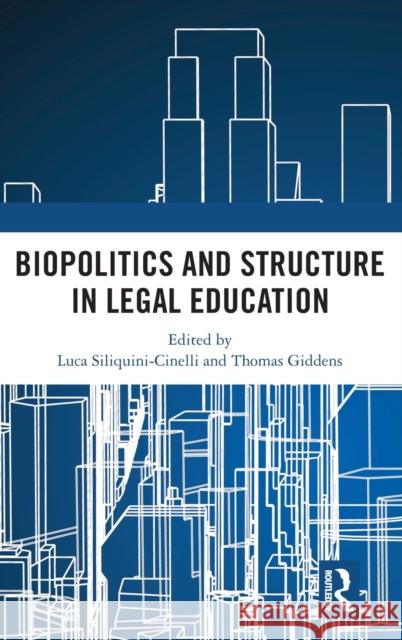Biopolitics and Structure in Legal Education » książka
Biopolitics and Structure in Legal Education
ISBN-13: 9781032006925 / Angielski / Twarda / 2023 / 280 str.
Taking up the study of legal education in distinctly biopolitical terms, this book provides a critical and political analysis of structure in the law school. Legal education concerns the complex pathways by which an individual becomes a lawyer, making the journey from lay-person to expert, from student to practitioner. To pose the idea of a biopolitics of legal education is not only to recognise the tensions surrounding this journey, but also to recognise that legal education is a key site in which the subject engages, and is engaged by, a particular structure – and here the particular structure of the law school. This book explores that structure by addressing the characteristics of the biopolitical orders engaged in legal education, including: understanding the lawyer as a commodity, unpicking the force relations in legal education, examining the ways codes of conduct in higher education impact academic freedom, as well as putting the distinctly western structures of legal learning within a wider context. Assembling original, field-defining, essays by both leading international scholars as well as emerging researchers, it constitutes indispensable resource in legal education research and scholarship that will appeal to legal academics everywhere.
Taking up the study of legal education in distinctly biopolitical terms, this book provides a critical and political analysis of structure in the law school.
Legal education concerns the complex pathways by which an individual becomes a lawyer, making the journey from lay-person to expert, from student to practitioner. To pose the idea of a biopolitics of legal education is not only to recognise the tensions surrounding this journey, but also to recognise that legal education is a key site in which the subject engages, and is engaged by, a particular structure – and here the particular structure of the law school. This book explores that structure by addressing the characteristics of the biopolitical orders engaged in legal education, including: understanding the lawyer as a commodity, unpicking the force relations in legal education, examining the ways codes of conduct in higher education impact academic freedom, as well as putting the distinctly western structures of legal learning within a wider context.
Assembling original, field-defining, essays by both leading international scholars as well as emerging researchers, it constitutes indispensable resource in legal education research and scholarship that will appeal to legal academics everywhere.











